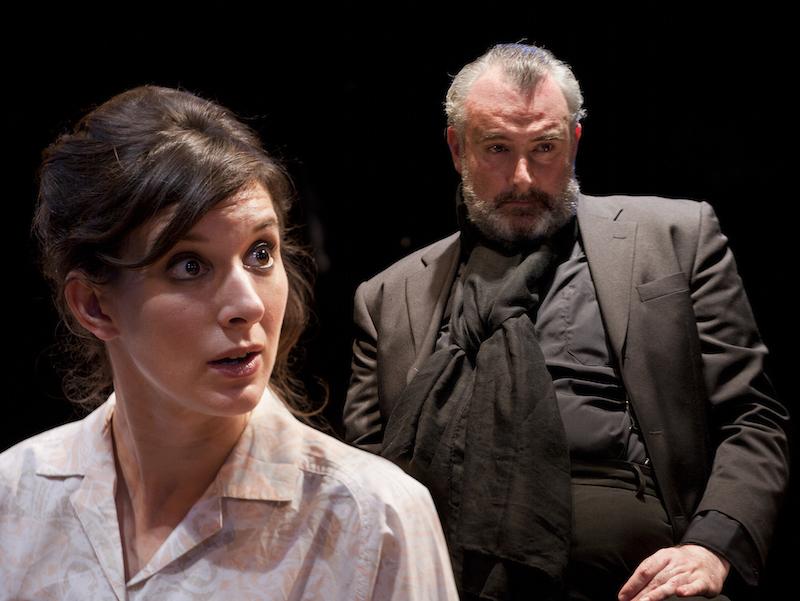Orson's Shadow, Southwark Playhouse | reviews, news & interviews
Orson's Shadow, Southwark Playhouse
Orson's Shadow, Southwark Playhouse
Dramatisation of Welles and Olivier’s backstage feud is one for the superfans

The latest transatlantic transfer is curiously esoteric, concerning as it does an obscure period in the lives of two great men: Laurence Olivier and Orson Welles. The centenary of the latter’s birth makes this an apt moment for the European premiere of Austin Pendleton’s Chicago-originating 2000 play, but its appeal may not extend beyond dedicated students of theatre history.
It’s 1960, and critic Kenneth Tynan (Edward Bennett) is determined to unite his beleaguered heroes, persuading the declining Welles (John Hodgkinson) to direct out-of-step Olivier (Adrian Lukis, pictured below) in Ionesco’s Rhinoceros at the Royal Court. This quixotic quest results, inevitably, in a giant clash of egos, fuelled by long-held resentments and rampant insecurity. Rehearsal ructions are rivalled by portentous tracking of medical conditions and domestic histrionics, with Olivier attempting to disentangle himself from unstable wife Vivien Leigh (Gina Bellman) in order to pursue co-star Joan Plowright (Louise Ford).
 Pendleton makes a decent case for this moment as a significant crisis point. Welles, dogged by the legend of Citizen Kane, has lost final cut privileges after abandoning yet another project, while Olivier fears obsolescence – does he have a place in the new theatrical landscape? Leigh is associated with his classical acting past, Plowright with possible modernist reinvention. Helpfully clueless assistant Sean (Ciaran O’Brien) elicits swathes of information, preceded by a fourth-wall-breaking apology from Tynan, who regrets turning “that nice young man into a receptacle for exposition”.
Pendleton makes a decent case for this moment as a significant crisis point. Welles, dogged by the legend of Citizen Kane, has lost final cut privileges after abandoning yet another project, while Olivier fears obsolescence – does he have a place in the new theatrical landscape? Leigh is associated with his classical acting past, Plowright with possible modernist reinvention. Helpfully clueless assistant Sean (Ciaran O’Brien) elicits swathes of information, preceded by a fourth-wall-breaking apology from Tynan, who regrets turning “that nice young man into a receptacle for exposition”.
The real Plowright has dismissed the play as largely fiction, and Pendleton freely admits to conflating, modifying and inventing, but the wealth of anecdotal detail lends it authenticity. Whether or not Olivier actually went to see Wesker’s Roots at the Court, marvelled at the gritty portrayal of poverty, then cut short his visit because Leigh was waiting outside in the idling Rolls-Royce, it’s a tale that informs our understanding of a man in limbo. Welles’s implosion may well have inspired Olivier to brave the trauma of revolution that the new era of drama represented.
The flagging, rotund Welles, meanwhile, can only identify with the rejected Falstaff – “I am old. I am old” – or with Rhinoceros’ everyman: “How could a man who has everything before him lose his way?” Hodgkinson nicely balances self-regard and self-pity, while Lukis sidesteps direct impersonation, but evokes elements of Olivier in his clipped delivery and image-conscious preening. Bellman’s manic depressive diva borders on caricature, but Ford’s eminently sensible Joan delights and Bennett effectively reveals Tynan’s boyish eagerness, though it’s a shame not to see more of the famously acidic wit.
Pendleton takes too long getting to the meat of the drama, and Alice Hamilton’s conservative in-the-round production lags. Still, there’s some interesting insight into the creative process, enjoyably catty barbs – Welles says of Olivier: “He thinks modern is anything this side of the 14th century” – and occasionally poignant exploration of the human tendency towards self-destruction, even as we proclaim a desperate need to survive.
rating
Explore topics
Share this article
The future of Arts Journalism
You can stop theartsdesk.com closing!
We urgently need financing to survive. Our fundraising drive has thus far raised £49,000 but we need to reach £100,000 or we will be forced to close. Please contribute here: https://gofund.me/c3f6033d
And if you can forward this information to anyone who might assist, we’d be grateful.

Subscribe to theartsdesk.com
Thank you for continuing to read our work on theartsdesk.com. For unlimited access to every article in its entirety, including our archive of more than 15,000 pieces, we're asking for £5 per month or £40 per year. We feel it's a very good deal, and hope you do too.
To take a subscription now simply click here.
And if you're looking for that extra gift for a friend or family member, why not treat them to a theartsdesk.com gift subscription?
more Theatre
 Ragdoll, Jermyn Street Theatre review - compelling and emotionally truthful
Katherine Moar returns with a Patty Hearst-inspired follow up to her debut hit 'Farm Hall'
Ragdoll, Jermyn Street Theatre review - compelling and emotionally truthful
Katherine Moar returns with a Patty Hearst-inspired follow up to her debut hit 'Farm Hall'
 Troilus and Cressida, Globe Theatre review - a 'problem play' with added problems
Raucous and carnivalesque, but also ugly and incomprehensible
Troilus and Cressida, Globe Theatre review - a 'problem play' with added problems
Raucous and carnivalesque, but also ugly and incomprehensible
 Clarkston, Trafalgar Theatre review - two lads on a road to nowhere
Netflix star, Joe Locke, is the selling point of a production that needs one
Clarkston, Trafalgar Theatre review - two lads on a road to nowhere
Netflix star, Joe Locke, is the selling point of a production that needs one
 Ghost Stories, Peacock Theatre review - spirited staging but short on scares
Impressive spectacle saves an ageing show in an unsuitable venue
Ghost Stories, Peacock Theatre review - spirited staging but short on scares
Impressive spectacle saves an ageing show in an unsuitable venue
 Hamlet, National Theatre review - turning tragedy to comedy is no joke
Hiran Abeyeskera’s childlike prince falls flat in a mixed production
Hamlet, National Theatre review - turning tragedy to comedy is no joke
Hiran Abeyeskera’s childlike prince falls flat in a mixed production
 Rohtko, Barbican review - postmodern meditation on fake and authentic art is less than the sum of its parts
Łukasz Twarkowski's production dazzles without illuminating
Rohtko, Barbican review - postmodern meditation on fake and authentic art is less than the sum of its parts
Łukasz Twarkowski's production dazzles without illuminating
 Lee, Park Theatre review - Lee Krasner looks back on her life as an artist
Informative and interesting, the play's format limits its potential
Lee, Park Theatre review - Lee Krasner looks back on her life as an artist
Informative and interesting, the play's format limits its potential
 Measure for Measure, RSC, Stratford review - 'problem play' has no problem with relevance
Shakespeare, in this adaptation, is at his most perceptive
Measure for Measure, RSC, Stratford review - 'problem play' has no problem with relevance
Shakespeare, in this adaptation, is at his most perceptive
 The Importance of Being Earnest, Noël Coward Theatre review - dazzling and delightful queer fest
West End transfer of National Theatre hit stars Stephen Fry and Olly Alexander
The Importance of Being Earnest, Noël Coward Theatre review - dazzling and delightful queer fest
West End transfer of National Theatre hit stars Stephen Fry and Olly Alexander
 Get Down Tonight, Charing Cross Theatre review - glitz and hits from the 70s
If you love the songs of KC and the Sunshine Band, Please Do Go!
Get Down Tonight, Charing Cross Theatre review - glitz and hits from the 70s
If you love the songs of KC and the Sunshine Band, Please Do Go!
 Punch, Apollo Theatre review - powerful play about the strength of redemption
James Graham's play transfixes the audience at every stage
Punch, Apollo Theatre review - powerful play about the strength of redemption
James Graham's play transfixes the audience at every stage
 The Billionaire Inside Your Head, Hampstead Theatre review - a map of a man with OCD
Will Lord's promising debut burdens a fine cast with too much dialogue
The Billionaire Inside Your Head, Hampstead Theatre review - a map of a man with OCD
Will Lord's promising debut burdens a fine cast with too much dialogue

Add comment